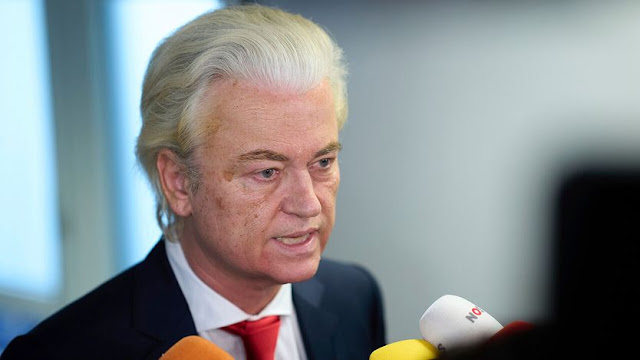The Dutch government is overthrown by the hard-right's champion.
After a dispute over migration, Geert Wilders pulled his far-right party out of the ruling coalition, which led to the collapse of the Dutch government.
Dick Schoof, the prime minister, announced his resignation on Tuesday and is anticipated to provide King Willem-Alexander with the cabinet's resignation before the end of the day.
"Irresponsible and unnecessary" is how Schoof described Wilders' decision to withdraw his PVV party's backing in a broadcast statement during an emergency cabinet meeting.
"This should not have happened, in my opinion," he continued.
Less than a year had passed since the coalition was established.
Wilders had requested ten further refugee-related restrictions, such as limiting family reunion, stopping the construction of reception centers, and freezing asylum applications.
"Our plans for asylum have not been signed. "PVV departs from the coalition," Wilders stated on X.
According to Wilders, he plans to become prime minister of the Netherlands "and ensure that the PVV gets bigger than ever in the next elections," he told reporters later on Tuesday.
Schoof's ministers are expected to hold onto power in a caretaker capacity until a date is decided for the Netherlands to go back to the polls because the NATO summit is scheduled to take place in the Hague at the end of the month.
On Tuesday morning, Schoof had made a last-minute plea to the leaders of the coalition parties, but the meeting ended after only one minute when Wilders left.
A number of political heavyweights expressed amazement and rage, pointing out that they would not obstruct the PVV's implementation of Wilders' proposals because they were comparable to measures previously included in the coalition agreement.
During coalition negotiations, several of Wilders' other plans had been rejected due to legal issues.
An unstable ruling alliance that was formed in July 2024 after months of political bickering after the previous year's elections has come to an end as a result of Wilders' decision.
The largest party was the far-right, anti-immigration PVV led by Geert Wilders. The Farmers' Citizen Movement (BBB), the centrist New Social Contract, and the conservative-liberal VVD are the other members, which are still officially part of the coalition.
Former coalition partners charged Wilders with orchestrating the crisis. "This was not about asylum at all," VVD leader Dilan Yesilgoz said, calling the action "extremely reckless."
BBB deputy prime minister Mona Keijzer stated, "I believe Wilders is betraying the Netherlands."
Jimmy Dijk, the leader of the opposition Socialist Party, described the ruling coalition as "four right-wing quarrelsome parties that do nothing" and declared that the nation had been "liberated from a political hostage situation."
According to Sandra Phlippen, chief economist of ABN AMRO bank, the administration had "scarcely formed any solid plans" in its 11 months in office, thus the immediate economic impact of the cabinet's fall seemed to be small.
The NRC newspaper claimed that the cabinet "that was meant to stand up for the citizenry was destroyed by amateurism and incompetence," indicating that the Dutch media was likewise displeased with the occurrences.
As support for his Freedom Party continues to decline in the polls, Armida van Rij, Head of the Europe Programme at Chatham House, said Wilders wanted the government to fall.
It is expected that Wilders would make the asylum problem the focal point of his next election campaign after upending the government over it.
There are no assurances that such a risk will be profitable, though, considering that his party had been in charge of immigration and asylum for nearly a year.





.webp)